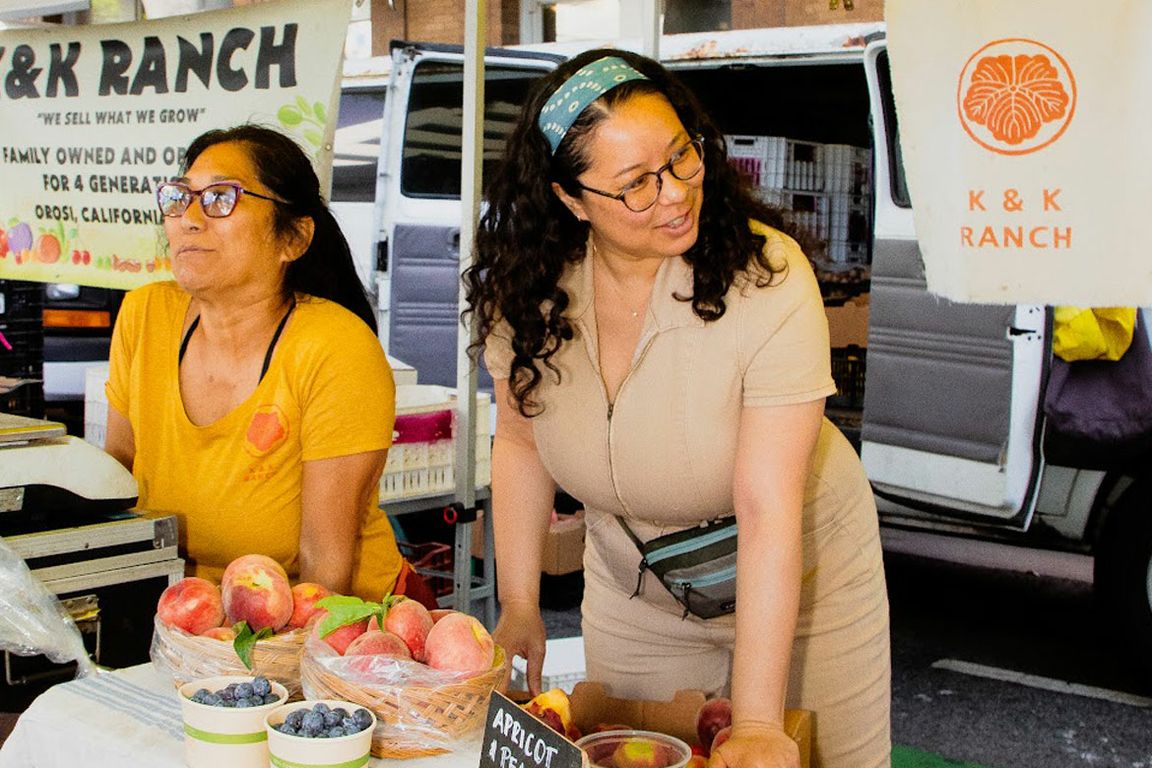
Family, community and food have always been at the core of Dorothy Faye Pirtle’s educational journey. Growing up African American and Korean American in what was once known as South Central Los Angeles, Pirtle, a dual master’s candidate in public policy and urban regional planning, has been a longtime social justice advocate.
“For me, it’s about leading an interdisciplinary life through school, food, cooking,” she said.
Pirtle’s interest in this life began in a very personal way. With few Asian ingredients found at local grocery stores, Pirtle’s mother, who is Korean, grew produce in their backyard. Pirtle was able to connect with that part of her heritage as she learned how to grow and cook her own food, such as using herbs like mugwort in savory dishes and knowing which types of lettuce were best for Korean lettuce wraps. One of Pirtle’s fondest childhood memories was eating her mom’s seaweed soup.
Her focus on community and activism also started early. At 12 years old, Pirtle witnessed the civil unrest that spread across Los Angeles in April 1992 following the acquittal of the officers charged in the beating of Rodney King. She would go on to attend community events and meet Asian American and Pacific Islander leaders such as Marcia Choo and K.W. Lee.
Lee, a pioneering Asian American journalist who called Pirtle his “adopted granddaughter” during her fellowship at the K.W. Lee Center for Leadership, taught her and other Koreans about cross-racial solidarity. Choo, who later wrote one of Pirtle’s recommendation letters for UCLA, also modeled for her the importance of community-building, service and engagement. They inspired her to think more deeply about racial inequality.
Community activism through food
Pirtle began her higher education journey at UC Irvine, where she majored in social science. She also received associate degrees in culinary arts/chef training, professional baking and restaurant management from Los Angeles Trade Technical College.
While living in South L.A. City after finishing trade school, Pirtle began to connect food, community and policy together.
Her local supermarket — which supports 75,000 people — shut down, leaving neighborhoods without fresh produce and other goods.
“If you wanted to buy a tomato or cilantro — or laundry detergent — where would you go? I created the California Black Council on Food Policy out of this need to address what was happening in my community,” she said.
The coalition has gone on to tackle food disparities through solutions driven by Black communities experiencing these issues.
Using her previous work experience managing farmers markets and working at a business development center, Pirtle devised the idea of helping entrepreneurs access resources within the farmers market space and created the nonprofit Lily of the Nile 1992. The organization, which she founded in 2021, operates farmers markets, farm stands and food distributions to bring California-grown produce to South Los Angeles. It provides research on farmers market programs and facilitates access to these markets even for those who are spatially segregated from them while also fostering community by celebrating African American culinary traditions.
Pirtle works with farmers from historically underrepresented backgrounds to help them write grants. She secured a Resilient Food Systems Infrastructure Program award for K&K Ranch, a family-owned farm, to purchase a refrigerated truck. She plans on establishing farmers markets across the area and hosting the farmers she writes grants on behalf of.
“This work is very much about relationships and honoring what people do,” Pirtle said.
From Lulu to the Luskin Center
Her farmers market expertise and culinary skills ultimately brought Pirtle to UCLA. She drew on this experience while working at Lulu at the Hammer Museum. Conceived by Alice Waters and David Tanis, the farm-to-table restaurant allows people to experience regenerative, sustainable and seasonal produce. As a forager, Pirtle sourced local food from farmers markets and from around L.A. for their rotating menu.
“I would ask the chef, ‘Is there something special you want to make, and is there an ingredient that you’re looking for?’ And then I would go out and find the item,” Pirtle said.
This work and the connections made at Lulu deepened Pirtle’s interest in pursuing further education at UCLA. Pirtle became a dual degree student because she believes public policy can take a finite amount of resources and create infinite public good, such as through programs like CalFresh and farmer subsidies to help address food insecurity and inequities.
For her, it was a full-circle moment: UCLA was always Pirtle’s dream school, and she recognizes UCLA professors Kimberlé Crenshaw and Cheryl Harris, both legal scholars on race and justice, as two of the main reasons why.
She plans to use the knowledge gleaned from her dual master’s to develop urban gardens and farmers markets in South L.A. Currently, she is working on developing a farmers market with her nonprofit Lily of the Nile 1992 and the Lulu Project, Lulu’s arm for regenerative food and community wellness.
“My impetus for attending graduate school was looking at the community I came from and figuring out how I can make a difference here,” she said. “It was about deepening my relationship to land, people and place.”
This article was originally published on UCLA Newsroom. Read the full article here.
发表回复